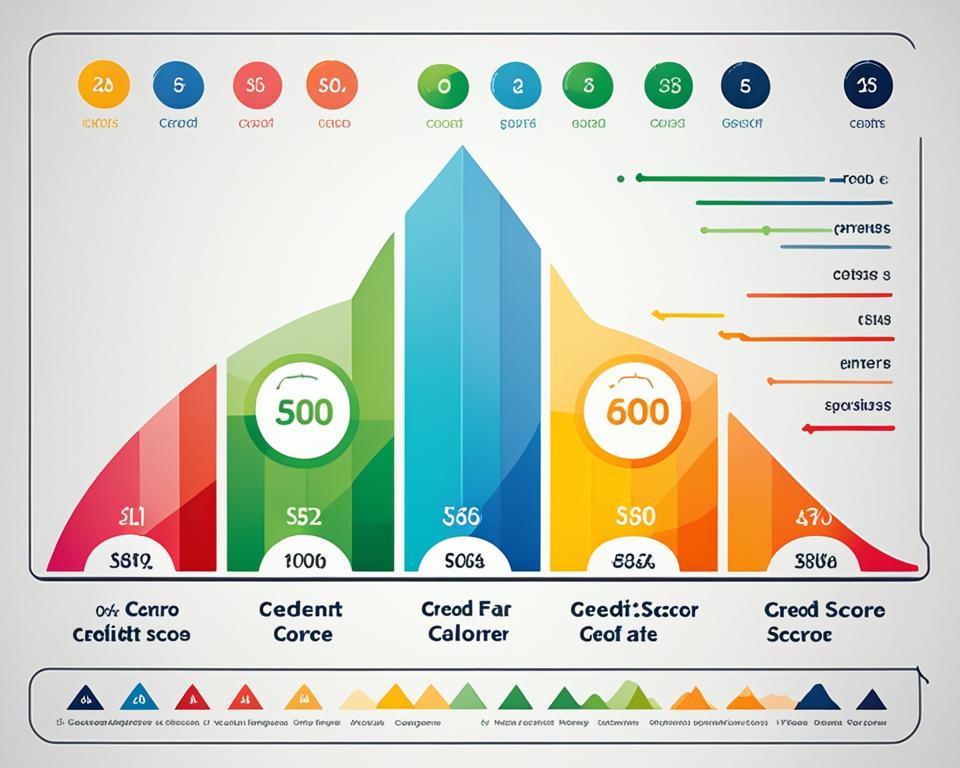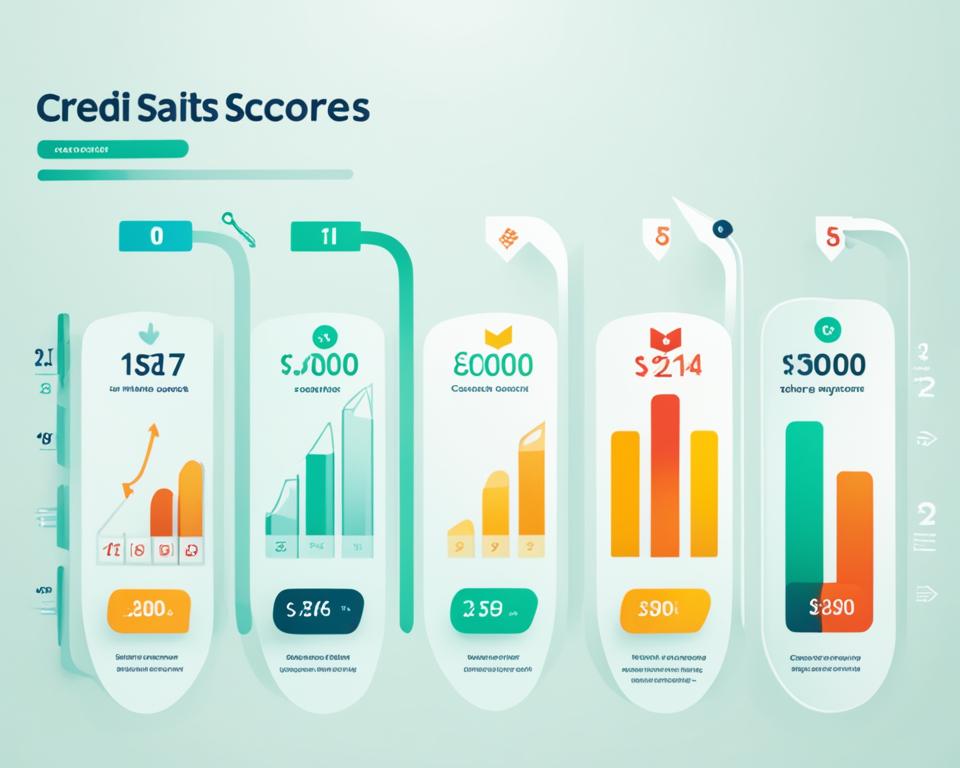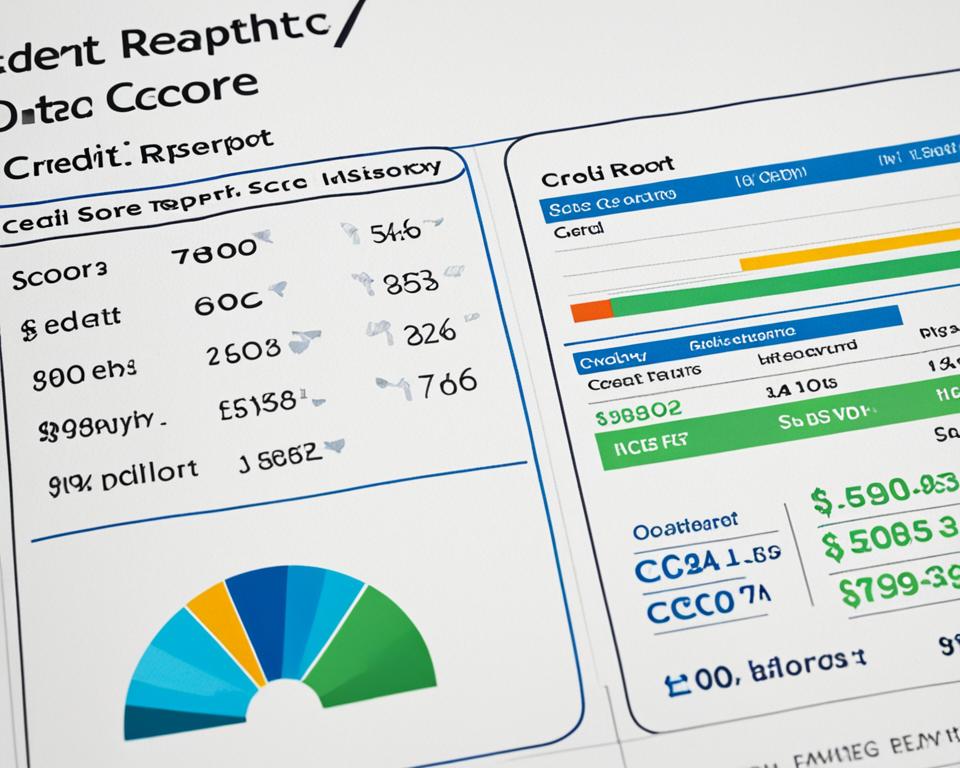Are you curious about how credit works? Whether you’re new to the world of credit or want to deepen your understanding, this comprehensive guide is here to help. From credit basics to credit score explanations, credit history overviews to establishing credit, and improving your credit score to understanding credit report details and credit card utilization, we’ve got you covered.
Credit plays a crucial role in various aspects of your financial life. It impacts your ability to borrow money, rent an apartment, buy a car, and even secure favorable insurance rates. By understanding how credit works, you can take charge of your financial health and make informed decisions that positively impact your creditworthiness.
Throughout this guide, we will break down the complex world of credit into easily digestible sections, providing you with the knowledge and tools to navigate the credit landscape confidently. Whether you’re looking to establish credit, improve your credit score, or gain a better understanding of credit history and reports, this guide will empower you to take control of your financial well-being.
Key Takeaways:
- Understanding credit is essential for managing your financial health.
- Credit impacts your ability to rent, buy, and secure favorable financial products.
- Establishing and maintaining good credit is vital for access to affordable credit.
- Improving your credit score requires understanding credit report details and credit card utilization.
- Regularly monitoring your credit is a key step in managing your credit effectively.
Why You Need a Good Credit Score
A good credit score is not just a number; it is a reflection of your financial health. It plays a vital role in various aspects of your life, from renting an apartment to buying a car or getting a mortgage. Understanding why a good credit score is essential can help you make informed financial decisions and secure favorable offers.
A good credit score demonstrates your creditworthiness and trustworthiness to lenders. When you have a strong credit score, lenders are more likely to offer you favorable financing options, such as lower interest rates and higher credit limits. This ultimately makes it cheaper for you to borrow money, saving you thousands of dollars over time.
When it comes to renting an apartment, landlords often check the credit scores of potential tenants. A good credit score increases the likelihood of being approved for your dream apartment, while a poor credit score might result in being denied the lease or having to pay a higher security deposit.
Having a good credit score is also crucial when you’re in the market for a new car. It helps you qualify for auto loans with better interest rates, which can save you significant amounts of money in the long run. With a good credit score, you can negotiate favorable loan terms and afford the vehicle you desire.
If you’re considering buying a home, a good credit score is a must. Mortgage lenders use credit scores to determine your creditworthiness and the terms of your loan. A better credit score increases your chances of approval and allows you to secure lower interest rates, potentially saving you tens of thousands of dollars over the life of your mortgage.
Insurance companies also consider your credit score when determining your rates. A good credit score can lead to lower insurance premiums, saving you money each month. On the other hand, a poor credit score may result in higher premiums, making it more challenging to find affordable coverage.
Furthermore, a good credit score unlocks access to rewards credit cards. These cards offer cash back, travel perks, and luxury benefits. When you have a good credit score, credit card issuers see you as a reliable borrower, making you eligible for the best rewards and exclusive offers.
Remember, a good credit score is an asset that opens doors to financial opportunities and better deals. By maintaining a good credit score, you can enjoy the benefits of favorable financing options, trustworthiness in the eyes of lenders, and access to top-tier rewards credit cards.
| Financial Benefits of a Good Credit Score |
|---|
| Lowers borrowing costs |
| Increases approval chances when renting an apartment |
| Qualifies for better car loan terms |
| Secures lower mortgage interest rates |
| Reduces insurance premiums |
| Unlocks access to top-tier rewards credit cards |
What is a Good Credit Score?
In the world of credit, a good credit score can open doors to financial opportunities and favorable terms. But what exactly is considered a good credit score? Let’s explore the credit score range, different credit scoring models, and credit ranges to understand what constitutes a good credit score.
Understanding the Credit Score Range
Credit scores, on a scale of 300 to 850, are used by lenders to assess an individual’s creditworthiness. Different credit scoring models, such as FICO Score and VantageScore, have their own set of credit score ranges.
The FICO Score ranges from 300 to 850 and is divided into five categories:
- Very Poor: 300-579
- Fair: 580-669
- Good: 670-739
- Very Good: 740-799
- Excellent: 800-850
The VantageScore ranges from 300 to 850 and also consists of five categories:
- Very Poor: 300-499
- Poor: 500-600
- Fair: 601-660
- Good: 661-780
- Excellent: 781-850
It’s important to aim for a credit score in the good to excellent range to increase your chances of loan and credit card approvals.
Different Credit Scoring Models and Credit Ranges
The credit scores that lenders see may vary depending on the credit scoring model used and the credit bureau from which they obtain the score. Both FICO Score and VantageScore are widely used credit scoring models, and lenders may use one or both of them.
To assess an individual’s creditworthiness, lenders typically pull credit scores from one or more of the major credit bureaus, including Experian, TransUnion, and Equifax. Each credit bureau may have slightly different credit information, leading to variations in the credit scores seen by lenders.
Summary: Aiming for a Good Credit Score
Having a good credit score is essential for accessing favorable terms on loans and credit cards. By aiming for a credit score in the good to excellent range, you enhance your creditworthiness and improve your chances of approval.
Next, we will explore the disadvantages of having a poor or fair credit score and the potential impact it can have on your financial life.
| Credit Score Range | FICO Score | VantageScore |
|---|---|---|
| Very Poor | 300-579 | 300-499 |
| Fair | 580-669 | 500-600 |
| Good | 670-739 | 601-660 |
| Very Good | 740-799 | 661-780 |
| Excellent | 800-850 | 781-850 |

What is the Difference Between a Good and Excellent Credit Score?
An excellent credit score is the highest tier of credit scores. For FICO, it falls between 800 and 850, while for VantageScore, it’s between 781 and 850. Many of the best credit cards require good or excellent credit for approval. With an excellent credit score, you have better approval odds for credit cards that offer generous rewards, luxury perks, and 0% APR periods. You can also finance new purchases or consolidate debt with a balance transfer card with good or excellent credit. However, credit score alone is not the only factor considered during credit card approval.
In addition to credit score, lenders and credit card issuers also consider other factors such as income, employment history, and existing debts. These factors help them evaluate your creditworthiness and assess the risk of lending to you. It’s important to maintain a good credit score, but also to manage your overall financial health.
Factors Considered During Credit Card Approval:
| Factors | Importance |
|---|---|
| Credit Score | High |
| Income | High |
| Employment History | Moderate |
| Existing Debts | Moderate |
“An excellent credit score can positively impact your ability to secure credit cards with attractive rewards programs and financing options. However, it’s important to remember that credit card approval is not solely based on credit score alone. Lenders take various factors into account to assess your overall creditworthiness. So, maintaining a good credit score along with a healthy financial profile is crucial.”
By understanding the difference between good and excellent credit scores, you can work towards improving your creditworthiness and gaining access to better financial opportunities. It’s essential to responsibly manage your credit and maintain a strong credit history to achieve your financial goals.
Disadvantages of Having a Poor or Fair Credit Score
A poor or fair credit score can have several negative consequences on your financial prospects. These lower credit scores can limit your options when it comes to credit cards and loans, and may result in less favorable terms for the credit you are approved for.
If your credit score falls within the poor or fair range, you may face reduced chances of approval for credit cards and loans. Lenders typically view individuals with poor or fair credit as higher-risk borrowers, making them hesitant to extend credit to these individuals. As a result, you may face more rejections and difficulties in obtaining credit when you need it.
Even if you are approved for credit, the terms may not be as favorable compared to those with better credit scores. Lenders often offer less favorable loan terms, such as higher interest rates or shorter repayment periods, to individuals with poor or fair credit. This means you could end up paying more in interest or having higher monthly payments, making it more challenging to manage your debts.
Table: Comparison of Credit Card Options for Different Credit Scores
| Credit Score | Credit Card Options |
|---|---|
| Poor | Limited options, primarily secured credit cards |
| Fair | Some options available, but with higher fees and lower credit limits |
| Good | More choices with better rewards and lower fees |
| Excellent | Access to the best rewards and premium credit cards |
Factors That Make Up Your Credit Score
Your credit score is a critical factor that lenders and financial institutions use to assess your creditworthiness. Understanding the components that determine your credit score can empower you to make informed decisions and take actionable steps to improve it. The calculation of credit scores varies depending on the credit scoring model used, but there are common factors that play a significant role in determining your score.
Payment History
Payment history is one of the primary factors considered in credit score calculation. It accounts for a significant portion of your credit score and reflects your consistency in making timely payments. Payment history includes information about late payments, missed payments, and any accounts that have been sent to collections. A track record of on-time payments can positively impact your credit score.
Amounts Owed
The amounts owed, also known as credit utilization, is another influential factor in credit score calculation. It refers to the percentage of your available credit that you have utilized. Keeping your credit card balances low and maintaining a low debt-to-credit ratio demonstrates responsible credit management and positively affects your credit score.
Length of Credit History
The length of your credit history contributes to your credit score. It takes into account the age of your credit accounts, including the oldest account and the average age of all your accounts. Having a longer credit history demonstrates stability and responsible credit management, which can have a positive impact on your credit score.
New Credit
The pursuit of new credit can affect your credit score. Opening multiple new credit accounts within a short period can raise concerns for lenders, as it may indicate an increased risk of accumulating excessive debt. Each new credit application can generate an inquiry on your credit report, potentially impacting your credit score temporarily. It’s essential to be strategic when applying for new credit.
Credit Mix
Your credit mix refers to the diversity of credit types on your credit report. It takes into account the variety of accounts you have, such as credit cards, loans, and mortgages. Having a healthy credit mix, including both revolving credit (like credit cards) and installment loans (like car loans), can demonstrate your ability to manage different types of credit responsibly.
Factors That Make Up Your Credit Score
| Factors | Description |
|---|---|
| Payment History | Reflects your consistency in making timely payments |
| Amounts Owed | Percentage of your available credit that you have utilized |
| Length of Credit History | Age of your credit accounts and the average age of all your accounts |
| New Credit | The pursuit of new credit and its impact on your credit report |
| Credit Mix | The diversity of credit types on your credit report |
Understanding these factors that make up your credit score can help you take control of your financial well-being. By prioritizing timely payments, managing your credit utilization, maintaining a long credit history, being cautious with new credit applications, and diversifying your credit mix, you can improve your credit score and enhance your overall financial health.
How to Check Your Credit Score for Free
Checking your credit score is an important step in understanding your creditworthiness and exploring potential loan options. Fortunately, there are a few ways to obtain your credit score for free.
1. Credit Card Issuers
Many credit card issuers provide free credit score access to their cardholders. This enables you to regularly monitor your score and stay updated on any changes. Some credit card issuers even provide additional insights and tools to help you understand and improve your credit.
2. Free Credit Score Services
Aside from credit card issuers, there are several free credit score services available. These services allow you to check your credit score without any cost. By signing up for these services and providing some basic information, you can gain access to your credit score and receive valuable insights into your credit history.
It is recommended to check your credit score regularly, even if you are not actively applying for new credit. Monitoring your credit score can help you identify any potential issues, detect fraud or errors, and maintain a healthy credit profile.
Remember, your credit score plays a significant role in determining your eligibility for loans, credit cards, and other financial opportunities. By staying informed about your credit score, you can take proactive steps to improve it and make informed financial decisions.

| Ways to Check Your Credit Score for Free | Pros | Cons |
|---|---|---|
| Credit Card Issuers | – Easy and convenient access – Additional credit insights and tools |
– Limited to cardholders only – Score may not be updated frequently |
| Free Credit Score Services | – No cost – Accessible to anyone |
– Requires sign-up and personal information – Score may vary across different services |
What’s Your Credit and Why Does It Matter?
In a financial context, credit refers to your credit history, which provides an overview of your financial behavior and how you handle monetary obligations. It showcases your borrowing and repayment habits and serves as a gauge of your creditworthiness.
Lenders, landlords, insurance companies, and potential employers often review your credit history to assess your creditworthiness and evaluate the level of risk associated with extending credit or offering opportunities. Let’s delve into why your credit matters to these entities:
Lenders
Lenders, including banks, credit card companies, and other financial institutions, examine your credit history to determine the likelihood of you repaying borrowed money. A strong credit history increases your chances of loan approval and favorable interest rates, while a poor credit history may result in rejection or less favorable terms.
Landlords
When you apply for an apartment or rental property, landlords often review your credit history to assess whether you are a reliable tenant. A positive credit history demonstrates your ability to meet financial commitments, giving landlords confidence in your ability to pay rent on time.
Insurance Companies
Insurance companies consider your credit history when calculating insurance premiums. They use credit information to assess your level of risk and determine if you qualify for certain policies. A good credit history may result in lower premiums, while a poor credit history can lead to higher rates.
Potential Employers
Some employers perform credit checks as part of their hiring process, particularly for positions that involve financial responsibilities. They use credit history as a measure of financial responsibility and trustworthiness. While this practice is not universally applicable, it’s important to be aware of its relevance in certain industries.
Your credit history can also influence other aspects of your financial life, such as obtaining favorable terms for car loans and mortgages. By maintaining a positive credit history, you establish a reputation for financial responsibility and gain access to better financial opportunities.
| Entities | Why They Look at Your Credit History |
|---|---|
| Lenders | To assess creditworthiness and determine loan terms |
| Landlords | To evaluate reliability as a tenant |
| Insurance Companies | To calculate insurance premiums and assess risk |
| Potential Employers | For certain job positions, to gauge financial responsibility |
How Do You Know If Your Credit Is Good?
One of the best ways to assess the health of your credit is by checking your credit report. Your credit report provides a comprehensive summary of your credit history, including information on credit cards, loans, payment history, and other credit-related details. By reviewing your credit report, you can gain valuable insights into your financial standing and evaluate whether your credit is considered good.
Lenders rely on credit reports to assess your creditworthiness when making decisions on loan and credit card applications. They carefully examine your credit history to determine your ability to manage and repay debts responsibly. Therefore, by understanding the information on your credit report, you can gauge how lenders perceive your creditworthiness.
Checking your credit report regularly is crucial in maintaining and improving your credit health. It allows you to identify any errors or inaccuracies that may be negatively impacting your credit score. By addressing these issues promptly, you can ensure that your credit report reflects accurate and positive information.
The Role of Credit Bureaus
Credit bureaus play a vital role in compiling and maintaining your credit information. The three major credit bureaus in the United States are Equifax, Experian, and TransUnion. They gather information from various sources, such as lenders, financial institutions, and public records, to create your credit report.
Each credit bureau may have slightly different information on your credit report, as not all lenders report to every bureau. Therefore, it’s essential to check your credit report from all three bureaus to get a comprehensive view of your credit standing.
It’s worth noting that you are entitled to one free credit report from each of the three bureaus per year. You can request these reports through AnnualCreditReport.com, the only official website authorized by the Federal Trade Commission (FTC) for free credit reports. Taking advantage of this free resource will enable you to stay informed about the state of your credit.
Evaluating Your Credit for Loans and Credit Cards
When assessing your credit, lenders consider various factors, including your credit report, to determine your creditworthiness. They examine your payment history, credit utilization, length of credit history, new credit, and credit mix to gauge the level of risk you present as a borrower.
A good credit report reflects responsible financial behavior, a positive payment history, and a healthy credit utilization ratio. These factors demonstrate your ability to handle credit and meet your financial obligations.
If your credit is in good standing, you are more likely to qualify for loans and credit cards with favorable terms, such as lower interest rates and higher credit limits. On the other hand, a poor credit report may limit your access to credit or result in higher interest rates and less favorable terms.
By regularly checking your credit report and addressing any areas that require improvement, you can work towards maintaining a good credit standing. Taking proactive steps, such as making payments on time, keeping credit card balances low, and managing your debts responsibly, will help you establish and maintain a sustainable credit profile.
How Can You Protect Your Credit?
Protecting your credit is essential in today’s digital age. By implementing a few key strategies, you can safeguard your financial well-being and minimize the risk of fraud or identity theft. Here are some effective methods to protect your credit:
1. Credit Freeze
A credit freeze is a proactive step you can take to restrict access to your credit report. By freezing your credit, you prevent potential creditors from accessing your credit information, making it difficult for identity thieves to open new accounts in your name. To initiate a credit freeze, you need to contact each of the three major credit bureaus: Equifax, Experian, and TransUnion. Once in place, you can unfreeze your credit temporarily when necessary, such as when applying for new credit.
2. Credit Report Monitoring
Regularly monitoring your credit report allows you to stay updated on any changes or potential discrepancies. By reviewing your report periodically, you can quickly identify any inaccuracies, fraudulent activities, or unfamiliar accounts that may impact your credit score or financial reputation. There are various credit monitoring services available that provide real-time alerts and comprehensive monitoring of your credit information.
3. Dispute Credit Information
If you come across any incorrect or unauthorized information on your credit report, it’s crucial to dispute it promptly. By filing a dispute with the credit bureaus, you can request the removal or correction of inaccurate information. This process involves providing supporting documentation to prove the error and working with the credit bureaus to resolve the issue. Promptly addressing and resolving disputes can help maintain the integrity of your credit report.
4. Experian Boost®
Experian Boost® is a service offered by Experian, one of the major credit bureaus. It allows you to add positive payment history to your credit report, potentially boosting your credit score. By linking your bank accounts and verifying recurring bills, such as utilities and cellphone payments, Experian Boost® can include these positive payment histories in your credit file, providing a more comprehensive representation of your creditworthiness.
| Credit Protection Method | Overview |
|---|---|
| Credit Freeze | Restrict access to your credit report, making it harder for identity thieves to open new accounts. |
| Credit Report Monitoring | Regularly review your credit report for changes, inaccuracies, or fraudulent activities. |
| Dispute Credit Information | Take action to correct any errors or unauthorized information on your credit report. |
| Experian Boost® | Add positive payment history to your credit report, potentially improving your credit score. |
By implementing these credit protection measures, you can safeguard your credit and financial well-being. Remember to regularly monitor your credit report, dispute any discrepancies, and take advantage of services like Experian Boost® to enhance your credit profile. Protecting your credit is an ongoing effort that can help secure your financial future.
What Is a Credit Score?
A credit score is a three-digit number that reflects your creditworthiness. Lenders use credit scores to assess your eligibility for loans, determine interest rates, and approve credit card applications. Credit scores are based on the information in your credit reports and provide a snapshot of your credit health. Understanding your credit score is essential for financial planning and making informed credit decisions.
FICO Score vs. VantageScore
When it comes to credit scoring models, the two most commonly used ones are the FICO Score and VantageScore. Though they serve similar purposes, there are key differences between these models that you should be aware of when it comes to interpreting your credit scores accurately.
One key difference lies in their scoring requirements. FICO Scores have specific criteria that need to be met in order to calculate the score accurately. On the other hand, VantageScores have more flexible criteria, allowing for a broader range of credit profiles to be evaluated.
Both FICO Scores and VantageScores fall within a credit score range of 300 to 850. However, the specific ranges within this spectrum differ. Understanding the credit score ranges for each model is important in assessing your creditworthiness and determining your financial standing.
To get a clearer picture of how these credit scoring models work and how they may impact your creditworthiness, it’s important to dig deeper into their specific scoring requirements and credit score ranges. This will enable you to make informed decisions when it comes to managing your credit and improving your financial health.
By understanding the differences between the FICO Score and VantageScore, you can gain a better understanding of how your credit scores are calculated and how lenders may view your creditworthiness. This knowledge will empower you to take the necessary steps to improve your credit and make sound financial decisions.
Why Are There So Many Different Credit Scores?
Credit scoring models evolve over time to adapt to changes in consumer behavior and industry practices. As a result, different versions of credit scores are created. Additionally, credit scores can vary depending on the credit reporting agency used to calculate them due to varying information in credit reports. Industry-specific models also exist to cater to specific lending industries, providing more predictive information for those sectors.

One of the reasons for the existence of multiple credit scores is the need for regular updates. As consumers’ financial behaviors change, it’s crucial for credit scoring models to adapt accordingly. Updates help ensure that credit scores remain accurate and provide an up-to-date representation of an individual’s creditworthiness. By incorporating new data and adjusting scoring algorithms, credit score models can better assess credit risk and make more informed lending decisions.
Another factor contributing to the variety of credit scores is the presence of varying information in credit reports. Due to differences in reporting practices and the inclusion of different creditors, credit reports may contain varying data points. As a result, credit scores calculated using these reports may differ. It’s essential for lenders to consider this variability when evaluating credit applications and making lending decisions.
Furthermore, industry-specific credit scoring models exist to meet the unique needs of specific lending sectors. For example, there are credit scoring models specifically designed for mortgage lenders or auto lenders. These industry-specific models take into account factors that are particularly relevant to those industries, providing lenders with more predictive information to assess creditworthiness in their specific lending contexts.
In conclusion, the existence of various credit scores is a result of the dynamic nature of credit scoring models, varying information in credit reports, and the need for industry-specific predictive models. It’s important for consumers to be aware of these variations and to view credit scores as tools that lenders use to make credit decisions rather than as a universal measure of their creditworthiness.
What Factors Affect Your Credit Score?
Several factors play a crucial role in determining your credit score. By understanding these factors, you can take steps to improve your creditworthiness and achieve a better credit score. The key credit score factors include:
1. Payment History
Your payment history is a critical factor in determining your credit score. It tracks whether you make your payments on time, including credit card bills, loan installments, and other debts. Consistently making timely payments positively impacts your credit score, while late or missed payments can have a negative effect.
2. Amounts Owed
The amount of debt you owe, particularly in relation to your available credit limits, also affects your credit score. This factor is known as credit utilization. Keeping your credit card balances low in proportion to your credit limits demonstrates responsible credit management and can improve your score.
3. Length of Credit History
The length of your credit history is another factor that influences your credit score. Lenders prefer borrowers with a longer credit history as it provides a clearer picture of their credit management habits. Maintaining a long and positive credit history can boost your credit score over time.
4. New Credit
Opening new credit accounts can impact your credit score. Applying for multiple credit cards or loans within a short period may raise concerns among lenders. It suggests you might be taking on too much debt or facing financial difficulties. Limiting new credit applications can help maintain a higher credit score.
5. Credit Mix
Having a diverse mix of credit accounts can also contribute to a healthier credit score. It demonstrates your ability to handle different types of credit, such as credit cards, auto loans, mortgages, or personal loans. However, the impact of credit mix on your score is less significant compared to other factors.
By focusing on these credit score factors, you can take proactive steps to improve your creditworthiness and maintain a strong credit score. It’s essential to make timely payments, manage your credit card balances responsibly, maintain a long credit history, limit new credit applications, and have a diverse credit mix to achieve a better credit score.
What Is a Good Credit Score?
A good credit score is a vital component of financial success. It demonstrates creditworthiness and significantly improves your chances of obtaining loans and credit cards. A good credit score is typically defined as a score of 670 or higher.
Understanding FICO Score Ranges
FICO Scores are commonly used by lenders to evaluate creditworthiness. They categorize credit scores within specific ranges:
| FICO Score Range | Credit Rating |
|---|---|
| 800-850 | Exceptional |
| 740-799 | Very Good |
| 670-739 | Good |
| 580-669 | Fair |
| 300-579 | Poor |
Maintaining a good credit score within the FICO Score range ensures that lenders view you as a reliable borrower, increasing your eligibility for affordable credit options and securing more favorable terms.
Enhancing Creditworthiness with a Good Credit Score
With a good credit score, you gain access to a plethora of benefits:
- Increased Approval Chances: Lenders are more likely to approve loan and credit card applications from individuals with good credit scores, as they demonstrate a higher level of creditworthiness.
- Favorable Interest Rates: A good credit score allows you to secure loans and credit cards with lower interest rates, reducing the overall cost of borrowing.
- Expanded Credit Card Options: It opens up a wider range of credit card options, enabling you to choose from a variety of rewards programs, cash back offers, and exclusive perks.
- Improved Trustworthiness: A good credit score signifies your trustworthiness, establishing a positive reputation with lenders, landlords, and potential employers.
Having a good credit score is essential for achieving financial goals, obtaining loans, and unlocking attractive credit card offers. It is an indicator of your responsible credit management and sets the stage for a stronger financial future.

“A good credit score is like a financial passport that opens doors to better opportunities.” – Financial Expert
Conclusion
Understanding how credit works is essential for managing your finances effectively. Throughout this guide, we have provided comprehensive information on credit basics, credit scores, credit history, and how to improve your credit. By applying the knowledge gained, you can establish and maintain a healthy credit history, which is vital for your financial well-being.
Remember to regularly monitor your credit report to stay aware of any changes or potential issues. By doing so, you can quickly address discrepancies and take necessary steps to maintain a positive credit profile. Making timely payments and managing your credit responsibly are also crucial in improving your credit score and overall creditworthiness.
By understanding how credit works and taking proactive steps, you can maximize your financial opportunities, whether it’s securing a loan, getting favorable interest rates, or accessing credit cards with valuable rewards. Take control of your credit journey and build a solid foundation for your financial future!
FAQ
How does credit work?
Credit refers to your credit history, which describes how you use money and handle financial obligations. Lenders, landlords, insurance companies, and potential employers often look at your credit history to assess your creditworthiness. Your credit history can impact your eligibility for loans, job applications, apartment rentals, car purchases, and insurance. Understanding your credit and its significance is crucial for making informed financial decisions.
Why do I need a good credit score?
Having a good credit score is crucial for your overall financial picture. It affects your ability to rent an apartment, buy a car, and get a mortgage. A good credit score also leads to better rates on insurance and makes it cheaper to borrow money. Lenders see borrowers with good credit scores as trustworthy and are more likely to offer favorable financing options. Additionally, a good credit score unlocks access to the best rewards credit cards that offer cash back, travel perks, and luxury benefits.
What is considered a good credit score?
A good credit score is typically defined as a score of 670 or higher. Good credit indicates creditworthiness and increases your chances of approval for loans and credit cards. FICO Score ranges categorize credit scores as exceptional (800-850), very good (740-799), good (670-739), fair (580-669), and poor (300-579). Maintaining a good credit score is essential for accessing affordable credit and securing favorable terms.
What is the difference between a good and excellent credit score?
An excellent credit score is the highest tier of credit scores. For FICO, it falls between 800 and 850, while for VantageScore, it’s between 781 and 850. Many of the best credit cards require good or excellent credit for approval. With an excellent credit score, you have better approval odds for credit cards that offer generous rewards, luxury perks, and 0% APR periods. You can also finance new purchases or consolidate debt with a balance transfer card with good or excellent credit. However, credit score alone is not the only factor considered during credit card approval.
What are the disadvantages of having a poor or fair credit score?
Poor or fair credit scores can have several disadvantages. These include reduced approval chances for credit cards and loans, less favorable terms for approved credit, and limited credit card options, primarily secured cards. Even if your credit score falls within the poor or fair range, it’s important to take steps to improve your credit and increase your chances of approval for various financial products.
What factors make up my credit score?
Credit scores are calculated using different factors depending on the credit scoring model. Common factors include payment history, amounts owed, length of credit history, new credit, and credit mix. Payment history and amounts owed have the biggest impact on credit scores, followed by length of credit history and new credit. Credit mix also plays a role, but to a lesser extent. Understanding these factors can help you make informed decisions to improve your credit score.
How can I check my credit score for free?
Checking your credit score is essential to understand your creditworthiness and potential loan options. Many credit card issuers provide free credit score access to their cardholders. Additionally, there are free credit score services you can use to check your score. It’s recommended to check your credit score regularly, even if you’re not applying for new credit, to monitor and maintain a good score.
How do I protect my credit?
Protecting your credit involves several steps. You can place a credit freeze on your credit report to limit who can access it. Monitoring your credit report regularly helps detect any inaccuracies or potential fraud. If you find incorrect information, you can dispute it with the credit bureaus. Additionally, services like Experian Boost® allow you to add positive payment history to your credit report, potentially improving your credit score.
What is a credit score?
A credit score is a three-digit number that reflects your creditworthiness. Lenders use credit scores to assess your eligibility for loans, determine interest rates, and approve credit card applications. Credit scores are based on the information in your credit reports and provide a snapshot of your credit health. Understanding your credit score is essential for financial planning and making informed credit decisions.
What is the difference between FICO Score and VantageScore?
The two most commonly used credit scoring models are the FICO Score and VantageScore. While they serve similar purposes, there are differences between them. FICO Scores have specific scoring requirements, while VantageScores have more flexible criteria. The credit score ranges for both models fall within 300 to 850, but the specific ranges differ. Understanding the differences between FICO Score and VantageScore can help you interpret your credit scores accurately.
Why are there so many different credit scores?
Credit scoring models evolve over time to adapt to changes in consumer behavior and industry practices. As a result, different versions of credit scores are created. Additionally, credit scores can vary depending on the credit reporting agency used to calculate them due to varying information in credit reports. Industry-specific models also exist to cater to specific lending industries, providing more predictive information for those sectors.
What factors affect my credit score?
Several factors influence your credit score, including payment history, amounts owed, length of credit history, new credit, and credit mix. Payment history and credit utilization have the most significant impact on your score, followed by length of credit history and new credit. Credit mix also plays a role, but to a lesser extent. Understanding these factors helps you prioritize actions to improve your credit score.
How do I know if my credit is good?
You can determine if your credit is good by checking your credit report. Your credit report provides a summary of your credit history, including credit cards, loans, payment history, and other credit-related information. Lenders use credit reports to evaluate your creditworthiness when making decisions on loan and credit card applications. By reviewing your credit report, you can assess your credit and take necessary steps to maintain or improve it.
How do I establish credit?
Establishing credit involves obtaining credit accounts and responsibly managing them. This can be done by applying for a secured credit card or becoming an authorized user on someone else’s credit card. Making on-time payments and keeping credit card balances low can help build a positive credit history. Over time, this can lead to a higher credit score and better access to credit.
How can I improve my credit score?
Improving your credit score involves several actions. These include making all of your payments on time, keeping credit card balances low, paying off debt, and avoiding opening new credit accounts unless necessary. Regularly checking your credit report for inaccuracies and addressing any issues can also help improve your credit score over time.
How important is credit card utilization?
Credit card utilization, or the percentage of your available credit that you’re using, plays a significant role in your credit score. It’s recommended to keep your credit card utilization below 30% to maintain a good credit score. High credit card utilization can indicate financial strain and potential risk to lenders, negatively impacting your creditworthiness.
How does a credit report differ from a credit score?
A credit report is a detailed record of your credit history, including credit accounts, payment history, and other credit-related information. On the other hand, a credit score is a numerical representation of your creditworthiness based on the information in your credit report. Lenders use both the credit report and credit score to evaluate your creditworthiness when making lending decisions.
Why is it important to understand how credit works?
Understanding how credit works is crucial for managing your finances effectively. This guide has provided comprehensive information on credit basics, credit scores, credit history, and improving your credit. By applying the knowledge gained, you can establish and maintain a healthy credit history, improving your financial well-being. Remember to regularly monitor your credit report, make timely payments, and manage your credit responsibly.





